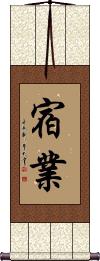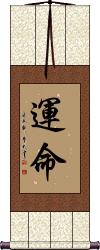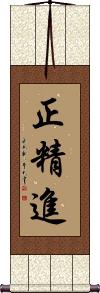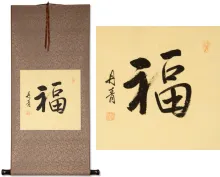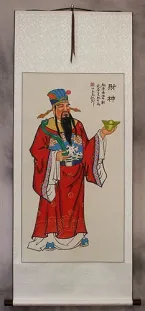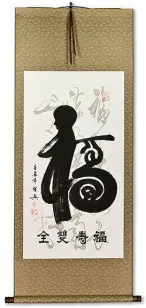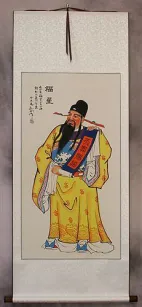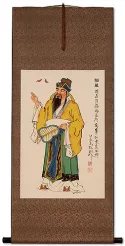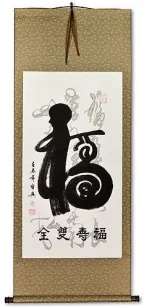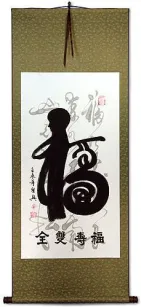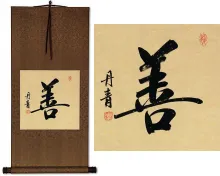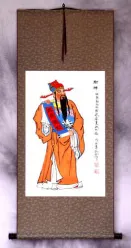Many custom options...
And formats...

Good Karma in Chinese / Japanese...
Buy a Good Karma calligraphy wall scroll here!
Personalize your custom “Good Karma” project by clicking the button next to your favorite “Good Karma” title below...
Karma (of your past lives)
宿業 is the Buddhist concept of Past Karma. Simply put, it's the sum of all the good and bad from all previous lives (perhaps earlier in your current life). This term is not commonly used outside of the Buddhist faith (you'll have a tough time finding a non-Buddhist Asian person that knows this word).
Other ways to translate this are “The karma of previous existence,” “The karma remaining from prior existences,” or simply “Former karma.”
See Also: Buddhism
Destiny / Fate
These two characters contain the ideas of fate, destiny, fortune, and luck in Chinese, Japanese Kanji, and old Korean Hanja.
運命 is often defined as “a person's fate” or “personal fate” in various dictionaries.
These two characters can be reversed (written in either order) and yield roughly the same meaning.
This particular character order is more common in old Korean and less common in modern Chinese.
See Also: Good Fortune | Good Luck
6. Right Effort / Right Endeavor / Perfect Effort
Samyag Vyayama / Samma Vayama
正精進 is one of the Noble Eightfold Paths of Buddhism. Right Effort, along with Right Mindfulness and Right Concentration, constitute the path to Concentration or Perfect Thought.
The proper effort is not the effort to make something particular happen. It is the effort to be aware and awake in each moment, the effort to overcome laziness and defilement, and the effort to make each activity of our daily meditation. This concept is about pursuing wholesome things that promote good karma.
Another definition: Cultivation of what is karmically wholesome and avoidance of what is karmically unwholesome.
This term is exclusively used by devout Buddhists. It is not a common term, and is remains an unknown concept to most Japanese and Chinese people.
See Also: Buddhism | Enlightenment | Noble Eightfold Path
This in-stock artwork might be what you are looking for, and ships right away...
Gallery Price: $31.00
Your Price: $16.88
Gallery Price: $65.00
Your Price: $39.88
Gallery Price: $90.00
Your Price: $49.88
Good Fortune / Prosperity Saint Wall Scroll
Discounted Blemished
Gallery Price: $71.00
Your Price: $39.00
Good Luck Special Calligraphy Wall Scroll
Discounted Blemished
Gallery Price: $53.00
Your Price: $29.00
Handmade Good Luck Special Calligraphy Wall Scroll
Discounted Blemished
Gallery Price: $35.00
Your Price: $19.00
Unique Good Luck Special Calligraphy Wall Scroll
Discounted Blemished
Gallery Price: $31.00
Your Price: $17.00
Decorative Good Luck Special Calligraphy Wall Scroll
Discounted Blemished
Gallery Price: $31.00
Your Price: $17.00
Gallery Price: $65.00
Your Price: $39.88
Not the results for good karma that you were looking for?
Below are some entries from our dictionary that may match your good karma search...
| Characters If shown, 2nd row is Simp. Chinese |
Pronunciation Romanization |
Simple Dictionary Definition |
業 业 see styles |
yè ye4 yeh waza わざ |
More info & calligraphy: Karmadeed; act; work; performance; (personal name) Hajime karman, karma, "action, work, deed"; "moral duty"; "product, result, effect." M.W. The doctrine of the act; deeds and their effects on the character, especially in their relation to succeeding forms of transmigration. The 三業 are thought, word, and deed, each as good, bad, or indifferent. Karma from former lives is 宿業, from present conduct 現業. Karma is moral action that causes future retribution, and either good or evil transmigration. It is also that moral kernel in which each being survives death for further rebirth or metempsychosis. There are categories of 2, 3, 4, 6, and 10; the 六業 are rebirth in the hells, or as animals, hungry ghosts, men, devas, or asuras: v. 六趣. |
根 see styles |
gēn gen1 ken ne ね |
root; basis; classifier for long slender objects, e.g. cigarettes, guitar strings; CL:條|条[tiao2]; radical (chemistry) (1) root (of a plant); (2) root (of a tooth, hair, etc.); center (of a pimple, etc.); (3) root (of all evil, etc.); source; origin; cause; basis; (4) one's true nature; (5) (fishing) reef; (personal name) Nemawari mūla, a root, basis, origin; but when meaning an organ of sense, indriyam, a 'power', 'faculty of sense, sense, organ of sense'. M.W. A root, or source; that which is capable of producing or growing, as the eye is able to produce knowledge, as faith is able to bring forth good works, as human nature is able to produce good or evil karma. v. 五根 and 二十二根. |
三因 see styles |
sān yīn san1 yin1 san yin miyori みより |
{Buddh} (See 三因仏性) three causes of Buddha nature; (place-name) Miyori The six "causes" of the Abhidharma Kośa 倶舍論 as reduced to three in the Satyasiddhi śāstra 成實論, i.e. 生因 producing cause, as good or evil deeds cause good or evil karma; 習因 habit cause, e.g. lust breeding lust; 依因 dependent or hypostatic cause, e.g. the six organs 六根 and their objects 六境 causing the cognitions 六識. |
三大 see styles |
sān dà san1 da4 san ta miou / mio みおう |
(prefix) (See 三大疾病) the big three ...; (surname) Miou The three great characteristics of the 眞如 in the 起信論 Awakening of Faith: (1) 體大 The greatness of the bhūtatathatā in its essence or substance; it is 衆生心之體性 the embodied nature of the mind of all the living, universal, immortal, immutable, eternal; (2) 相大 the greatness of its attributes or manifestations, perfect in wisdom and mercy, and every achievement; (3) 用大 the greatness of its functions and operations within and without, perfectly transforming all the living to good works and good karma now and hereafter. There are other groups, e.g. 體, 宗, and 用. |
三業 三业 see styles |
sān yè san1 ye4 san yeh sangou / sango さんごう |
{Buddh} (See 身口意) three activities (action, speech and thought) trividha-dvāra. The three conditions, inheritances, or karma, of which there are several groups. (1) Deed, word, thought, 身, 口, 意. (2) (a) Present-1ife happy karma; (6) present-life unhappy karma; (c) 不動 karma of an imperturbable nature. (3) (a) Good; (b) evil; (c) neutral karma. (4) (a) 漏業 Karma of ordinary rebirth; (6) 無漏業 karma of Hīnayāna nirvana; (c) 非漏非無漏 karma of neither, independent of both, Mahāyāna nirvana. (5) (a) Present deeds and their consequences in this life; (b) present deeds and their next life consequences; (c) present deeds and consequences after the next life, There are other groups of three. |
三行 see styles |
sān xíng san1 xing2 san hsing miyuki みゆき |
(g,p) Miyuki Three lines of action that affect karma, i.e. the ten good deeds that cause happy karma; the ten evil deeds that cause unhappy karma; 不動業 or 無動行 karma arising without activity, e.g. meditation on error and its remedy. |
二果 see styles |
èr guǒ er4 guo3 erh kuo nika |
Sakṛdāgāmin; v. 裟 and 斯. The second "fruit" of the four kinds of Hīnayāna arhats, who have only once more to return to mortality. Also the two kinds of fruit or karma: (a) 習氣果 The good or evil characteristics resulting from habit or practice in a former existence; (b) 報果the pain or pleasure resulting (in this life) from the practices of a previous life. |
二業 二业 see styles |
èr yè er4 ye4 erh yeh nigyou / nigyo にぎょう |
(archaism) restaurants and geisha establishments Two classes of karma. (1) (a) 引業 leads to the 總報, i.e. the award as to the species into which one is to be born, e.g. men, gods, etc.; (6) 滿業 is the 別報 or fulfillment in detail, i.e. the kind or quality of being e.g. clever or stupid, happy or unhappy, etc. (2) (a) 善業 and (b) 惡業 Good and evil karma, resulting in happiness or misery. (3) (a) 助業 Aids to the karma of being reborn in Amitābha's Pure—land e. g. offerings, chantings, etc.; (b) 正業 thought and invocation of Amitābha with undivided mind, as the direct method. |
五乘 see styles |
wǔ shèng wu3 sheng4 wu sheng gojō |
The five vehicles conveying to the karma reward which differs according to the vehicle: they are generally summed up as (1) 入乘 rebirth among men conveyed by observing the five commandments; (2) 天乘 among the devas by the ten forms of good action; (3) 聲聞乘 among the śrāvakas by the four noble truths; (4) 緣覺乘 among pratyekabuddhas by the twelve nidānas; (5) 菩薩乘 among the Buddhas and bodhisattvas by the six pāramitās 六度 q. v. Another division is the various vehicles of bodhisattvas; pratyekabuddhas; śrāvakas; general; and devas-and-men. Another is Hīnayāna Buddha, pratyekabuddhas, śrāvakas, the gods of the Brahma heavens, and those of the desire-realm. Another is Hīnayāna ordinary disciples: śrāvakas: pratyekabuddhas; bodhisattvas; and the one all-inclusive vehicle. And a sixth, of Tiantai, is for men; devas; śrāvakas-cum-pratyekabuddhas; bodhisattvas: and the Buddha-vehicle. The esoteric cult has: men, corresponding with earth; devas, with water: śrāvakas, with fire: pratyekabuddhas, with wind; and bodhisattvas, with 空 the 'void'. |
勝報 胜报 see styles |
shèng bào sheng4 bao4 sheng pao shōhō しょうほう |
news of a victory superior reward (for good karma) |
十力 see styles |
shí lì shi2 li4 shih li jūriki |
Daśabala. The ten powers of Buddha, giving complete knowledge of: (1) what is right or wrong in every condition; (2) what is the karma of every being, past, present, and future; (3) all stages of dhyāna liberation, and samādhi; (4) the powers and faculties of all beings; (5) the desires, or moral direction of every being; (6) the actual condition of every individual; (7) the direction and consequence of all laws; (8) all causes of mortality and of good and evil in their reality; (9) the end of all beings and nirvāṇa; (10) the destruction of all illusion of every kind. See the 智度論 25 and the 倶舍論 29. |
善因 see styles |
shàn yīn shan4 yin1 shan yin zenin ぜんいん |
(Buddhism) good karma {Buddh} (ant: 悪因) good cause (that will bring a good reward); good deed Good causation, i.e. a good cause for a good effect. |
善緣 善缘 see styles |
shàn yuán shan4 yuan2 shan yüan |
good karma |
四力 see styles |
sì lì si4 li4 ssu li shiriki |
The four powers for attaining enlightenment: independent personal power; power derived from others; power of past good karma; and power arising from environment. |
四業 四业 see styles |
sì yè si4 ye4 ssu yeh shi gō |
four types of admixture of good and evil karma |
天道 see styles |
tiān dào tian1 dao4 t`ien tao tien tao tendou / tendo てんどう |
natural law; heavenly law; weather (dialect) (1) (てんとう only) the sun; (2) god of heaven and the earth; (3) laws governing the heavens; (4) {astron} celestial path; celestial motion; (5) {Buddh} (See 六道) deva realm (svarga); (surname, given name) Tendō deva-gati, or devasopāna, 天趣. (1) The highest of the six paths 六道, the realm of devas, i. e. the eighteen heavens of form and four of formlessness. A place of enjoyment, where the meritorious enjoy the fruits of good karma, but not a place of progress toward bodhisattva perfection. (2) The Dao of Heaven, natural law, cosmic energy; according to the Daoists, the origin and law of all things. |
天鼓 see styles |
tiān gǔ tian1 gu3 t`ien ku tien ku tenko てんこ |
(given name) Tenko The deva drum— in the 善法 Good Law Hall of the Trayas-triṃśas heavens, which sounds of itself, warning the inhabitants of the thirty-three heavens that even their life is impermanent and subject to karma: at the sound of the drum Indra preaches against excess. Hence it is a title of Buddha as the great law-drum, who warns, exhorts, and encourages the good and frightens the evil and the demons. |
妙行 see styles |
miào xíng miao4 xing2 miao hsing myoukou / myoko みょうこう |
(female given name) Myōkou The profound act by which a good karma is produced, e.g. faith; v. 一行一切行. |
定業 定业 see styles |
dìng yè ding4 ye4 ting yeh teigyou / tegyo ていぎょう |
regular employment Fixed karma, rebirth determined by the good or bad actions of the past. Also, the work of meditation with its result. |
宿善 see styles |
sù shàn su4 shan4 su shan sukuzen |
Good deeds done in previous existence. |
宿福 see styles |
sù fú su4 fu2 su fu shukufuku |
Happy karma from previous existence. |
散業 散业 see styles |
sàn yè san4 ye4 san yeh sangō |
The good karma acquired in a life of activity. |
果報 果报 see styles |
guǒ bào guo3 bao4 kuo pao kahou / kaho かほう |
karma; preordained fate (Buddhism) (noun or adjectival noun) (1) good fortune; luck; happiness; (noun or adjectival noun) (2) {Buddh} (See 業・ごう・1) vipaka (retribution); (female given name) Kaho 異熟 Retribution for good or evil deeds, implying that different conditions in this (or any) life are the variant ripenings, or fruit, of seed sown in previous life or lives. |
業力 业力 see styles |
yè lì ye4 li4 yeh li gōriki |
(Buddhism) karma The power of karma to produce good and evil fruit. |
業因 业因 see styles |
yè yīn ye4 yin1 yeh yin gouin / goin ごういん |
karma The deed as cause; the cause of good or bad karma. |
業報 业报 see styles |
yè bào ye4 bao4 yeh pao gouhou / goho ごうほう |
karma effects; fate; inevitable retribution Karma-reward; the retribution of karma, good or evil. |
業秤 业秤 see styles |
yè chèng ye4 cheng4 yeh ch`eng yeh cheng gō no hakari |
The scales of karma, in which good and evil are weighed by the rulers of Hades. |
業風 业风 see styles |
yè fēng ye4 feng1 yeh feng gōfu |
Karma-wind: (1) the fierce wind of evil karma and the wind from the hells, at the end of the age; (2) karma as wind blowing a person into good or evil rebirth. |
死相 see styles |
sǐ xiàng si3 xiang4 ssu hsiang shisou / shiso しそう |
(1) look of death (in one's face); shadow of death; (2) (See 死に顔) face of a dead person The appearance of death; signs at death indicating the person's good or evil karma. |
淨業 淨业 see styles |
jìng yè jing4 ye4 ching yeh jōgō |
Good karma; also the deeds which lead to birth in the Pure Land. |
Click here for more good karma results from our dictionary
The following table may be helpful for those studying Chinese or Japanese...
| Title | Characters | Romaji (Romanized Japanese) | Various forms of Romanized Chinese | |
| Karma (of your past lives) | 宿業 宿业 | shukugou / shukugo | sù yè / su4 ye4 / su ye / suye | su yeh / suyeh |
| Destiny Fate | 運命 运命 | un mei / unmei | yùn mìng / yun4 ming4 / yun ming / yunming | yün ming / yünming |
| 6. Right Effort Right Endeavor Perfect Effort | 正精進 正精进 | sei shou jin seishoujin sei sho jin | zhèng jīng jìn zheng4 jing1 jin4 zheng jing jin zhengjingjin | cheng ching chin chengchingchin |
| In some entries above you will see that characters have different versions above and below a line. In these cases, the characters above the line are Traditional Chinese, while the ones below are Simplified Chinese. | ||||
Successful Chinese Character and Japanese Kanji calligraphy searches within the last few hours...
